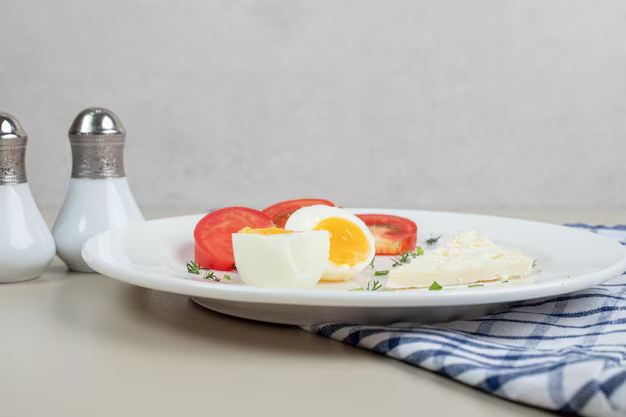How Long Can You Keep Boiled Eggs in the Fridge?
Boiled eggs are a staple in many homes, serving as a quick protein boost and a versatile ingredient in many recipes. But a common question arises: how long can these eggs, once boiled, hang out in the refrigerator before they become a cause for concern? Let’s crack open this question and explore not just the lifespan of boiled eggs, but also how to make the most out of every egg-cellent possibility.
Understanding the Shelf Life of Boiled Eggs
Boiled eggs aren’t meant to last forever, and understanding their shelf life is crucial for food safety. When eggs are boiled, the protective coating on the shell is washed away, making them more vulnerable to bacteria. Typically, boiled eggs can be safely stored in the refrigerator for up to one week. This period allows you to prepare in advance and enjoy them across meals without unnecessary waste or worry.
Key Factors Impacting Storage Time
- Refrigeration: Boiled eggs should be stored in the fridge as soon as possible after cooking to extend their freshness.
- Shell Intact: Keeping the shell on your boiled eggs can help them last longer compared to peeled ones, as the shell acts as a natural barrier to bacteria.
- Temperature Consistency: Store eggs in the refrigerator, maintaining a consistent temperature. Frequent temperature changes increase the chance of spoilage.
The Best Practices for Storing Boiled Eggs
To maximize the shelf life of your boiled eggs and ensure they remain safe to eat, follow these best practices:
Storage Tips
- Refrigerate Promptly: Place boiled eggs in the fridge within two hours of cooking.
- Use Airtight Containers: Store eggs in a sealed container to minimize odor and contamination risks.
- Label with Date: For easy tracking, label the container with the boiling date so you know exactly when they are due for consumption.
Peeling and Preparation
If you love to have boiled eggs readily available for snacks or cooking, decide whether to peel them right away or not:
- Unpeeled Eggs: Keep the shell on if storage time is primary concern as this extends freshness.
- Peeled Eggs: If you choose to peel them in advance for convenience, ensure they’re stored in an airtight container with moist paper towels to retain moisture.
Why the Refrigerator is Critical
The refrigerator is a non-negotiable for boiled egg storage. It helps to prevent bacterial growth and keeps eggs safe. The right refrigeration temperature should be maintained at or below 40°F (4°C). It's also recommended to store boiled eggs on an inner shelf rather than in the door where temperature fluctuations tend to occur more frequently.
🥚 Quick Guide: Make the Most Out of Your Boiled Eggs
- Prepare Smart: Boil only what you anticipate using within a week.
- Keep It Cool: Refrigerate immediately after boiling.
- Mind the Shell: Preserve the shell when possible.
- Monitor Shelf Life: Use within seven days for the best quality.
Related Subtopics to Explore
Thinking beyond storage, boiled eggs present a multitude of usage possibilities. Here’s how you can branch out:
Nutritional Value of Boiled Eggs
Boiled eggs are packed with essential nutrients, making them a fantastic dietary choice. They’re an excellent source of protein, vitamins, and minerals that benefit overall health. By boiling eggs, you retain most of their nutritional content. Incorporating them into meals supports a balanced diet, contributing to muscle repair, brain function, and energy levels.
Creative Culinary Uses
Beyond deviled eggs or simple snacks, boiled eggs can be the star in various dishes:
- Salads: Add slices to salads for protein and texture.
- Sandwiches and Wraps: Enhance flavor and substance in sandwiches.
- Ramen Toppings: Add richness and depth to broth-based dishes.
Storing Other Types of Cooked Eggs
You might also prepare scrambled or poached eggs regularly. While boiled eggs have a specific shelf life guide, other egg types differ:
- Scrambled Eggs: Best consumed within three to four days.
- Egg-Based Casseroles: These should be eaten within three to four days of preparation.
Recognizing Spoilage in Boiled Eggs
Knowing the signs of spoilage helps you avoid potential health risks. Spoiled eggs often emit a sulfur-like smell, have discolored whites or yolks, or exhibit slimy textures. When in doubt, play it safe and discard any suspicious eggs.
Maximizing Boiled Egg Use: A Sustainable Approach
Reducing food waste is a win for both the planet and your wallet. Here’s how to ensure that your boiled eggs are used efficiently:
- Plan Recipes: Integrate boiled eggs into meal planning. Anticipate their use across breakfast, lunch, and dinner.
- Batch Cook: Boil eggs in bulk if used frequently, saving time and resources.
- Love Your Leftovers: Creative reinterpretation of leftovers prevents food waste.
📝 Summary: Key Takeaways for Egg Enthusiasts
- Boiled eggs can last up to seven days in the fridge.
- Store them in airtight containers for maximum freshness.
- Check for spoilage signs before consumption.
- Integrate eggs effectively into your meal plan to avoid waste.
By following these guidelines, you'll ensure that boiled eggs remain a practical, safe, and nutritious part of your diet. From understanding their shelf life to creatively incorporating them into meals, these insights should empower you to expand the possibilities of your meals while maintaining food safety. Whether for their nutritional excellence or culinary versatility, boiled eggs offer more than meets the eye. 😊🥚
Understanding how to properly store and use boiled eggs means you’ll always have a reliable and healthy protein source at your fingertips, ready to complement any meal or snack choice you make.

